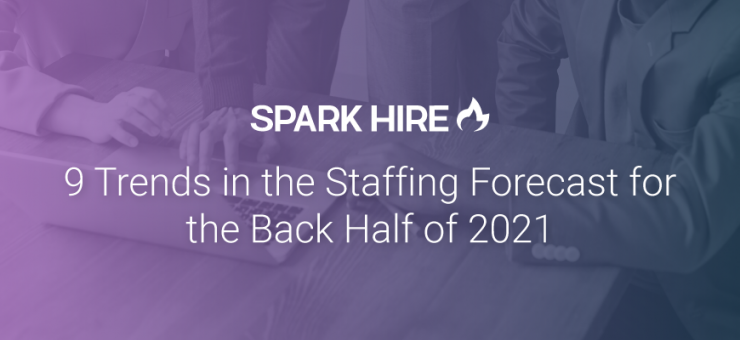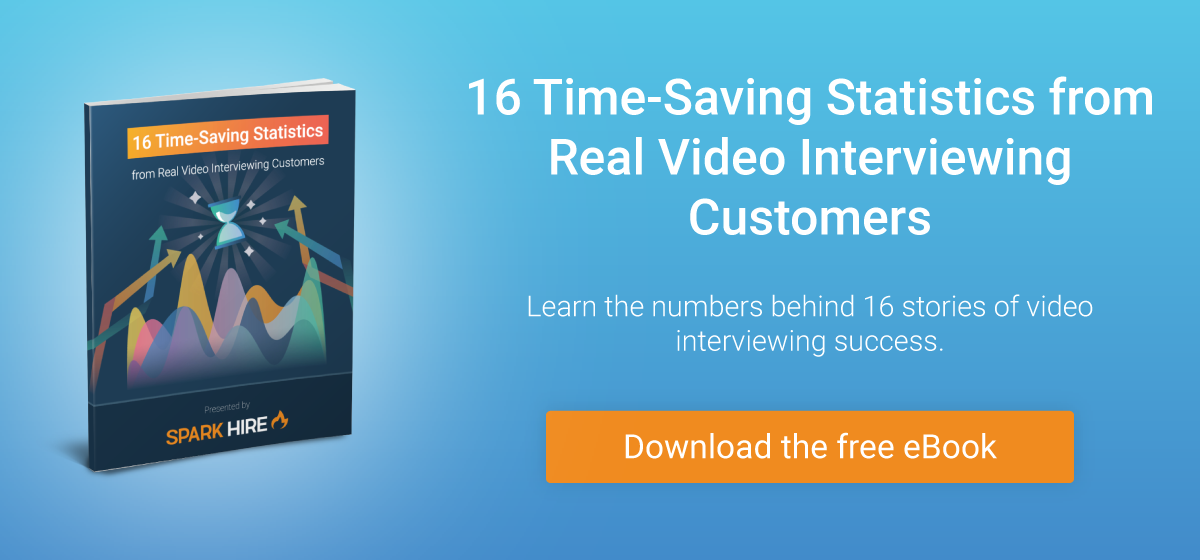The staffing industry has faced many changes and challenges since the start of the pandemic in March 2020. Over a year later, the staffing forecast now indicates that there’s no going back to how it used to be.
In the second half of 2021, the hybrid work model will shift staffing strategies. And it’ll likely continue to be a prevalent topic in hiring for years to come. After all, hybrid affects everything from who your candidates are to how you can best screen them.
To gauge the trends and popular predictions, we asked business leaders and hiring pros for their take on the industry. Here’s what they’re noticing on the staffing forecast:
1. Advantages of the vast talent pool
 Not only is hiring and onboarding a remote worker more efficient and cheaper, but it also expedites the process since there are thousands of qualified professionals worldwide who can apply for the position. In contrast, onsite work only limits applicants within a certain mile radius from the company establishment.
Not only is hiring and onboarding a remote worker more efficient and cheaper, but it also expedites the process since there are thousands of qualified professionals worldwide who can apply for the position. In contrast, onsite work only limits applicants within a certain mile radius from the company establishment.
Stephen Light, CMO and co-owner of Nolah Mattress
—
We love the hybrid trend as the candidate pool gets larger to wider demographics. Mothers who were not able to work now can work because they can work and tend to the children at home. Lower-income jobs (such as tech support, etc.) now do not have to spend 3 hours commuting to the city to come into work as they can work from home.
 Alex Kovalenko, Senior IT Recruitment Director, Kovasys IT Recruiters
Alex Kovalenko, Senior IT Recruitment Director, Kovasys IT Recruiters
—
 It’s wonderful that there are now so many routes for you to discover top talent. But it’s all a waste if you find great candidates and can’t offer them a rewarding candidate experience. You must be prepared and design the experience to impress the talent of every generation.
It’s wonderful that there are now so many routes for you to discover top talent. But it’s all a waste if you find great candidates and can’t offer them a rewarding candidate experience. You must be prepared and design the experience to impress the talent of every generation.
2. Online events are critical
Hybrid recruitment will only become more and more important as hundreds of employers globally start introducing more flexible remote working procedures. This makes online recruitment events a lot more important, and part of the mainstream as recruiters no longer need to just look at the pool of talent in the immediate vicinity.

While face-to-face events will still be important, introducing this hybrid approach opens potential hiring to a completely new audience of candidates.
This is a massive benefit to employers reaching many more talented candidates and a game changer for employees who are reaching organisations that before may have seemed impossible.
Alex Magnin, CEO and founder, Alex Magnin
—

This staffing forecast demonstrates that you must become comfortable in all settings to be successful. From remote to in-person interviews to online platforms and events and traditional networking gatherings, practice being yourself and setting others at ease wherever you meet them.
3. Specificity is a must
Know exactly what you’re looking for and be specific in your job descriptions and needs. Don’t just say it’s a “hybrid” position — this can mean a lot of different things, so you need to specify your expectations for in-office versus remote work.

Similarly, you should fully describe the position’s responsibilities and compensation in the post and know which of your job requirements are must-haves and which are more preferences than necessities.
The shift to a more global talent market has increased the “white noise” effect for candidates and hiring managers, making it harder for both to find what they’re looking for. The more specific you are, the easier it will be for the right applicants to find you.
Jon Hill, CEO and chairman, The Energists
—
 Whether or not you’re the one responsible for crafting job descriptions, you must be able to explain the role expectations aloud and in writing. Candidates will have questions. You can’t undervalue confidence and concision when responding.
Whether or not you’re the one responsible for crafting job descriptions, you must be able to explain the role expectations aloud and in writing. Candidates will have questions. You can’t undervalue confidence and concision when responding.
4. Technology remains a necessity
 With remote work as a backbone option, employers are now shaping a global net for remote employees. To sift through this greater talent pool, recruiters must adopt hiring technologies such as computerization and AI.
With remote work as a backbone option, employers are now shaping a global net for remote employees. To sift through this greater talent pool, recruiters must adopt hiring technologies such as computerization and AI.
Best of all, companies are seeing they can achieve all this without losing the vital human network that employees still covet.
Brack Nelson, Marketing Director, Incrementors
—
 Targeted recruiting has been provend as the best option for our firm. Targeted recruiting, the use of technology in recruiting, and flexible working will dominate HR practices as employers choose a hybrid form of work in the post-Covid-19 future.
Targeted recruiting has been provend as the best option for our firm. Targeted recruiting, the use of technology in recruiting, and flexible working will dominate HR practices as employers choose a hybrid form of work in the post-Covid-19 future.
In the post-Covid-19 context, reinventing recruiting techniques to maintain seamless organization running and long-term growth will would be the way ahead.
Miranda Yan, co-founder, VinPit
—
 My favorite staffing trend is definitely video interviews. It takes a lot of the pressure off of interviewees to interview from home. It also lets businesses interview a bunch of people in a row with minimum hassle along the way.
My favorite staffing trend is definitely video interviews. It takes a lot of the pressure off of interviewees to interview from home. It also lets businesses interview a bunch of people in a row with minimum hassle along the way.
Ann Martin, Director of Operations, CreditDonkey
—
 Anyone who’s paid attention to the staffing forecast over the past few years knows tech has been vital all along! But there’s never a wrong time to assure you that technology in the staffing process is trustworthy to find the best talent quickly.
Anyone who’s paid attention to the staffing forecast over the past few years knows tech has been vital all along! But there’s never a wrong time to assure you that technology in the staffing process is trustworthy to find the best talent quickly.
5. Diversity and inclusion efforts will get a boost
One trend I expect to see across the staffing industry in 2021 is increased attention to diversity and inclusion efforts throughout recruitment, interviewing, hiring, and training.
 There’s increased interest in how to pull from a wider pool of candidates and put inclusion at the forefront of the staffing process. Some of this means looking beyond the usual sources of candidates. It also means better training that addresses topics such as how to spot and deal with microaggressions in the workplace.
There’s increased interest in how to pull from a wider pool of candidates and put inclusion at the forefront of the staffing process. Some of this means looking beyond the usual sources of candidates. It also means better training that addresses topics such as how to spot and deal with microaggressions in the workplace.
Fortunately, hybrid hiring makes it easier than ever to broaden the candidate pool and find personnel who can help companies meet their culture goals.
Daivat Dholakia, Director of Operations, Force by Mojio
—
 Hiring plays a critical part in supporting and improving a company’s diversity and inclusion practices. When there are so many options that assist with unbiased staffing, there’s no excuse not to implement an inclusive hiring process.
Hiring plays a critical part in supporting and improving a company’s diversity and inclusion practices. When there are so many options that assist with unbiased staffing, there’s no excuse not to implement an inclusive hiring process.
6. Preference for experienced remote workers
 I see companies changing their criteria and mechanism for hiring new employees for the current office settings. Candidates who can adapt to a hybrid working environment will be prioritized because hybrid workplaces are the future.
I see companies changing their criteria and mechanism for hiring new employees for the current office settings. Candidates who can adapt to a hybrid working environment will be prioritized because hybrid workplaces are the future.
Lisa Arlington, Founder, Gifts Nerd
—
 I do think we’ll see far more placements for people who have a proven track record of independent work in a remote environment. Employers already had to start over in 2020 and train many of their permanent staff to be productive in a remote environment. Staffing agencies are supposed to make things easy, so they’ll want their hires pre-trained.
I do think we’ll see far more placements for people who have a proven track record of independent work in a remote environment. Employers already had to start over in 2020 and train many of their permanent staff to be productive in a remote environment. Staffing agencies are supposed to make things easy, so they’ll want their hires pre-trained.
—
Jake Hill, CEO, DebtHammer
 You can’t afford to lose talent who has proven they can succeed in a remote work environment. To keep them engaged, use video messaging to prove you know how to manage remote communication.
You can’t afford to lose talent who has proven they can succeed in a remote work environment. To keep them engaged, use video messaging to prove you know how to manage remote communication.
7. Solutions needed for the skills gap
 The number of unique and hard-to-find skills employers are looking for has risen dramatically in 2021. This ultimately means that organizations have a hard time finding suitable candidates on the market or upskilling the capabilities of their existing workforce fast enough.
The number of unique and hard-to-find skills employers are looking for has risen dramatically in 2021. This ultimately means that organizations have a hard time finding suitable candidates on the market or upskilling the capabilities of their existing workforce fast enough.
Thus, companies will shift from trying to find or build skills to just hiring and paying a premium for those skills when the need arises. The use of contingent and contract hiring will expand; companies will also start to “rent” employees, or freelancers, for shorter periods to bridge the skills gap.
Irene McConnell, Managing Director, Arielle Executive
—
 The second half of 2021 and the hiring process will see a much bigger focus on a mixed set of skills for the hybrid workplace. As companies move into this new model of work, business leaders will expect employees to understand how to use technology for remote positions and fit into an office environment.
The second half of 2021 and the hiring process will see a much bigger focus on a mixed set of skills for the hybrid workplace. As companies move into this new model of work, business leaders will expect employees to understand how to use technology for remote positions and fit into an office environment.
There may be a multi-level hiring process whereby employers “test” compatibility in each environment or a specific set of skills that hiring managers will look out for. Employees will need to have some level of independence if they’re going to work effectively in remote positions, but they’ll also need to be able to feed off of the energy present in an office environment.
Teri Shern, Co-founder, Conex Boxes
—
 Another way to fight the talent shortage is by using video interviews strategically. There’s no doubt that this state of the job market will hang around on the staffing forecast for a while. Leverage the tools now to reduce stress on the long-term concern about skills.
Another way to fight the talent shortage is by using video interviews strategically. There’s no doubt that this state of the job market will hang around on the staffing forecast for a while. Leverage the tools now to reduce stress on the long-term concern about skills.
8. Temp workers are trending
 Talent-based hiring is obviously not as important now that there are staff shortages which means we may see a rise in temp jobs as companies lend out positions for people to gain experience. Likewise, we may see a fall in the value of qualifications.
Talent-based hiring is obviously not as important now that there are staff shortages which means we may see a rise in temp jobs as companies lend out positions for people to gain experience. Likewise, we may see a fall in the value of qualifications.
When you consider that some jobs are only suitable to highly qualified individuals, we may see the opposite in those high-end talent-based jobs, where talent-based hiring becomes even more valuable. Essentially it will be those with low-end skills that suffer the most.
Amy Troutman, Head of Business Operations, Resourceful Compliance
—
 My top predictions for the staffing industry in the second half of 2021 are that the supply of temps will grow, and workplaces will start using remote staffing in earnest.
My top predictions for the staffing industry in the second half of 2021 are that the supply of temps will grow, and workplaces will start using remote staffing in earnest.
In the wake of the pandemic, we see a lot of movement out of historically low-paying industries, who don’t provide benefits, and come with high health risks. People are working in temporary roles to break into industries where their prospects are better.
Ravi Parikh, CEO, RoverPass
—
 According to these contributors’ staffing forecast, you can expect to see more requests for temp workers very soon. It’s not ideal for the long-term, but it does help reduce talent acquisition stress. When assessing candidates for temp positions, ensure they are willing to put in the work to learn and succeed.
According to these contributors’ staffing forecast, you can expect to see more requests for temp workers very soon. It’s not ideal for the long-term, but it does help reduce talent acquisition stress. When assessing candidates for temp positions, ensure they are willing to put in the work to learn and succeed.
9. Recruiters must do more to adapt
 Recruiters, nowadays, have to adapt to changes in the style of work and hiring. They are expected to expand their skill sets, virtual hiring, and conducting virtual interviews as these have become the new norm and continue to set the standard even in 2021.
Recruiters, nowadays, have to adapt to changes in the style of work and hiring. They are expected to expand their skill sets, virtual hiring, and conducting virtual interviews as these have become the new norm and continue to set the standard even in 2021.
Improving their informational skills and carrying out employee training are just some of the new skills that are now compulsory for a good recruiter.
Jeff Johnson, Owner and Acquisition Manager, Simple Homebuyers
—
 To hire effectively, reach out to people from different disciplines to enrich your company. No college major prepares someone for exactly the job they receive, so take advantage of the people who have unusual backgrounds that might add flavor to your business.
To hire effectively, reach out to people from different disciplines to enrich your company. No college major prepares someone for exactly the job they receive, so take advantage of the people who have unusual backgrounds that might add flavor to your business.
Jim Pendergast, Senior Vice President, atlLINE Sobanco
—
My No. 1 tip for staffing in 2021 is to look beyond the big job sites like Indeed, Monster, and LinkedIn. Find industry-specific websites and even online social groups or pages where you can advertise.
Ravi Parikh, CEO, RoverPass
—
 This staffing forecast looks at the rest of 2021, but there are plenty more changes to come. Of all the lessons from the pandemic, the top of the list is the necessity of flexibility. Maintaining your adaptability will keep your in-person, hybrid, or virtual hiring strategy successful.
This staffing forecast looks at the rest of 2021, but there are plenty more changes to come. Of all the lessons from the pandemic, the top of the list is the necessity of flexibility. Maintaining your adaptability will keep your in-person, hybrid, or virtual hiring strategy successful.












